Livelihoods improving through green businesses in Rwamwanja Settlement
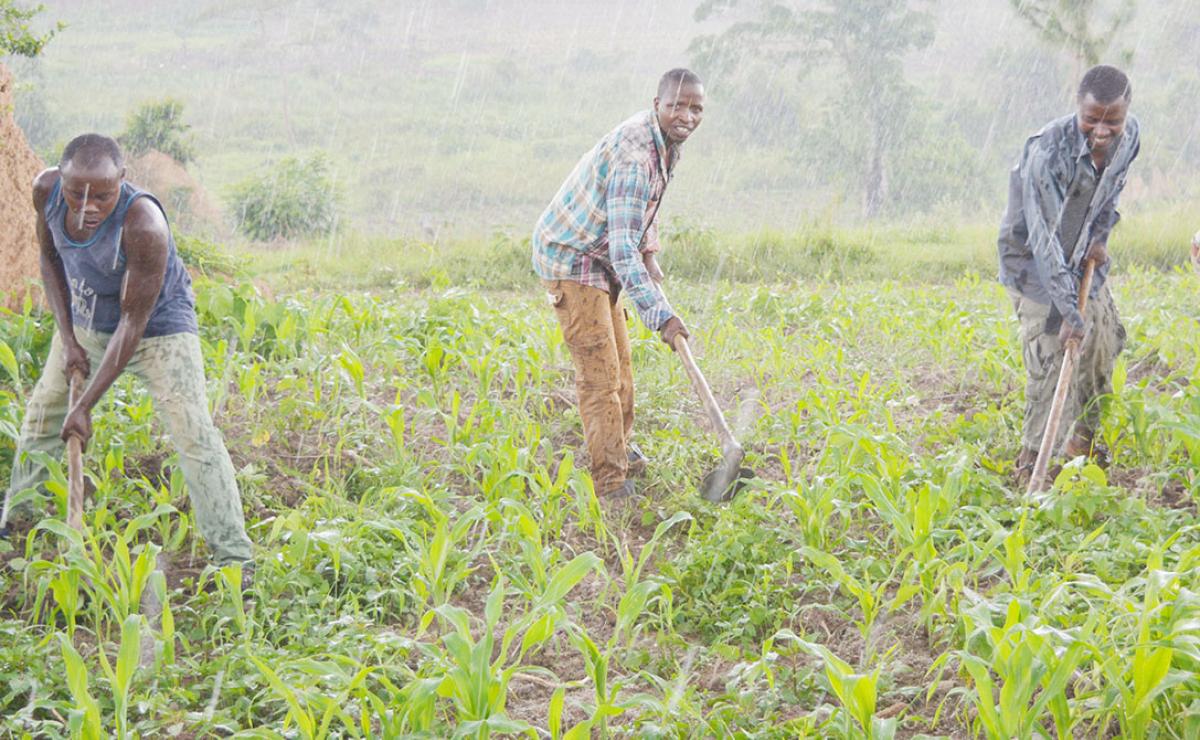
They till their garden for at least 8 hours a day, 5 days a week during Uganda’s wet seasons. The White Doves garden as a group in the fertile hills and valleys of Rwamwanja settlement located in Uganda’s south western region. The group of 15 Congolese refugees does this with an aim of accumulating good harvests for food and sale.
For the last wet season (March to May, 2017), the group harvested 15 bags of maize grain, each weighing at least 150 kilograms.
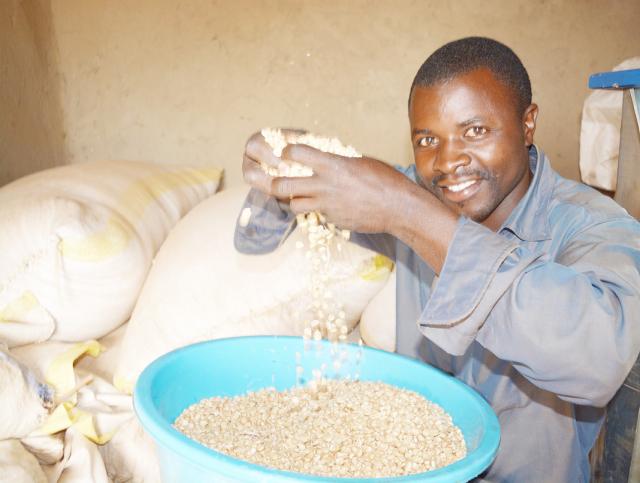
“We don’t sleep hungry anymore because we shared 5 bags of grain for food. This will supplement our monthly food ratio until the next harvest. We shall sell off the remaining 10 bags during the dry season when food is scarce and prices are high,” said Jean Paul Mugisha, the Group Leader. “A kilogram of maize grain is currently at UGX 1,000; we shall sell when it gets to UGX 2,000.”
The group expects to reinvest their profits in farming with hope of owning a bigger maize and rice farm that will supply food all over the settlement.
“We are dreaming big and working determinedly because we want to stop depending on aid. We think we can work for a living and also give a chance to new refugee arrivals like, South Sudanese to receive the same assistance,” said Mugisha who arrived in Uganda in 2014.
To achieve financial independence, Emmanuel Twagiramungu, the group Secretary explains that they plan on setting up a sustainable income generating activity for each member with profits from their agriculture and energy stove making businesses.
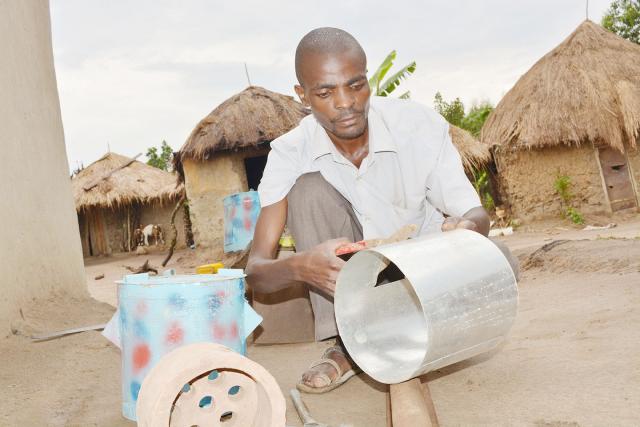
Energy saving stove crafting and trading budding more green businesses
The White Doves acquired capital for their agriculture business from an energy stove making business in which they still engage to date.
“We meet every Thursday and Saturday to make energy saving stoves. We sell each at UGX 20,000 (€4) in and out of the settlement,” Mugisha said. “We sell between 20 to 30 stoves per month and earn between 200,000 (€46) to 600,000 (€139) respectively” Twagiramungu added.
The White Doves were trained on how to make energy saving stoves and were also offered start-up capital for the stove business by the Lutheran World Federation (LWF) with support from the EU Humanitarian Aid.
“We trained and offered business start-up kits with all materials required to make stoves to 7 groups of Congolese refugees and the host community residents to facilitate them earn a living through environmentally friendly industries,” said Shyne Nyamate, a Project Officer with LWF. “This would improve their livelihoods, self-reliance and also facilitate environmental conservation by reducing the consumption of firewood as the stoves use briquettes or charcoal.”
The White Doves saved profits from their energy saving stove business and ventured in agriculture. “We saved UGX 220,000 (€51), hired half an acre of land from a national and bought seeds to venture in commercial agriculture,” said Twagiramungu.
The group diverts the rest of the profits from the stove business to a Village Savings and Loan Association (VSLA) they formed to facilitate entrepreneurship through saving and acquiring loans.
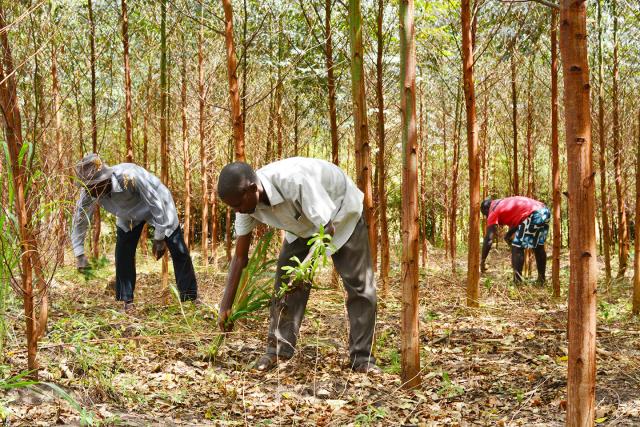
Just like White Dove, Rwencwera United Families, an energy saving stove making group also diversified by venturing in tree farming and VSLA. Moses Twinamasiko, the group’s Secretary explains that they ventured in tree farming to earn a living and also conserve the environment.
“Rwamwanja was green with thick bushes everywhere before our brothers from Congo were settled here. But they are no more as they were slashed down to create space for their shelter,” Twinamasiko said. “We bought an eucalyptus tree farm and we planting more trees to replace some of those that were cut as a way of protecting the community from global warming.”
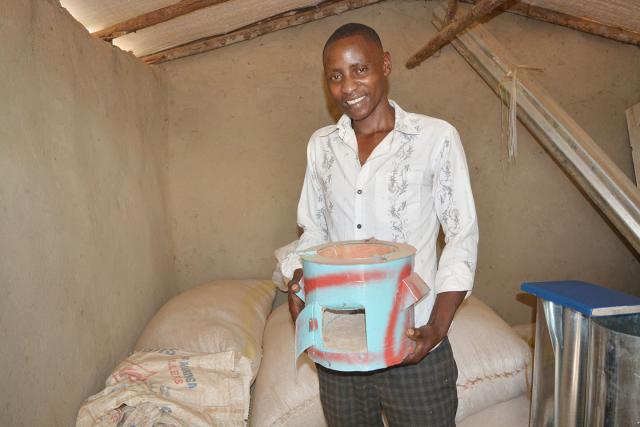
Lives changing with incomes from green businesses and VSLAs
With profits from the energy saving stoves, VSLAs, and agriculture businesses the livelihoods and lifestyle of both refugees and national beneficiaries have improved as Mugisha explains that their level of financial independence has increased.
“We don’t have to exchange our household materials for food anymore, we plant and harvest enough to supplement the food ratio,” Mugisha. “We also earn money from selling stoves and our harvests, hence a step closer to financial independence.”
Through VSLAs, Mugisha says group members can acquire loans to establish individual ventures and also meet other financial needs.
“I saved UGX 500,000 (€116) with our VSLA last year, and when we shared the savings, I bought 5 goats. 2 have birthed 3 kids. I now have 8 and I expect to get more,” said Zawadi Alice a member of White Dove Group. “Buying the 5 goats was my first step towards establishing a goat farm.”
Hanifer Komwaka, a member of Rwencerwa says she pays her children’s school fees and buys household items even when she is strapped. “I get loans to meet my financial needs and pay back when I get money,” adds Komwaka.
To enhance self-reliance, better livelihoods and environment protection, LWF trained and offered start-up capital to 7 groups of refugees and host community residents to make energy efficient stoves as a source of income.
Many thanks to the EU Humanitarian Aid for supporting LWF's project aimed at improving livelihoods and self-reliance among refugees and host community residents in Rwamwanja settlement.

